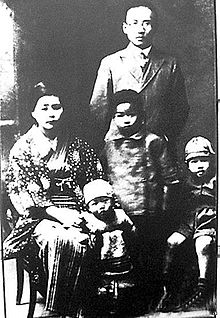Guo Moruo
Guo Moruo ( Chinese 郭沫若 , Pinyin Guō Mòruò ; * 1892 under the name Guo Kaizhen ( Chinese 郭開貞 / 郭开贞 , Pinyin Guō Kāizhēn ) in Leshan County, Sichuan Province ; † June 12, 1978 ) was a Chinese writer and politician .
Life
As the son of a merchant and large landowner , Guo Moruo was initially given a classical education, from 1906 to 1913 at four different schools. A marriage imposed on him by his parents was dissolved with immediate effect.
Subsequently, Guo Moruo went to Japan in 1914 to study medicine and graduated from Kyushu Imperial University in 1923 , but never practiced his profession.
After he had also acquired knowledge of English, German and Latin during this time, his work in the literary field began in 1917, initially with the translation of poems; In 1919 I wrote my first own story.
With the publication of his collection of poems, Göttinnen , he achieved his breakthrough as a poet in 1921 . He had also joined the literary society Creation and used this forum to present his work.
Due to his family roots, he did not begin to deal with political theories such as Marxism until 1924, and with his participation in the northern campaign in 1925 and the Nanchang uprising in 1927, he finally became active in this area as well, in order to support the next after the failure to move back to Japan for ten years.
Forced to return to China when the war broke out in 1937, he helped to repel the Japanese attack through the Resistance Society of Art and Literature Creators and a position as head of the propaganda department. However, with the break up of the united front between Guomindang and Communists , he lost this post in 1940, but was given one that was cheaper in terms of his literary work.
As a result of the disputes between communists and the government and the associated repression after the end of the war, Guo Moruo was forced to flee to Hong Kong in 1947 , but joined the communist fighting units a year later during the civil war.
With the establishment of the People's Republic of China in 1949, he was immediately promoted to the offices of Deputy Prime Minister and Chairman of the Culture and Education Council, a short time later to President of the Academy of Sciences , and beforehand and for the rest of his life to that of Chairman of the Chinese Writers' Association .
Other important positions he held included:
- 1950 - the chairmanship of the Chinese section of the World Peace Council ,
- 1954 - Deputy Chairmanship of the National People's Congress ,
- 1955 - Deputy Chairmanship of the World Peace Council ,
- 1958 - the presidency of the newly established Scientific and Technical University in Beijing ,
- 1969 - Membership in the Central Committee of the Communist Party of China .
As part of these activities, he accompanied a large number of delegations abroad.
At the beginning of the Cultural Revolution in 1966, Guo Moruo was initially persecuted. In order to save face, he declared in a public self-criticism his earlier works as errors that should be burned. He then praised Mao's wife Jiang Qing and the Cultural Revolution in poems , and also denounced former friends and colleagues as counterrevolutionaries . However, this was not enough to protect his family. Two of his sons, Guo Minying and Guo Shiying, died officially by suicide in 1967 and 1968.
His loyalty to Mao helped him survive the Cultural Revolution and receive a pledge from the 9th Party in April 1969. By the early 1970s, he had largely regained his influence and was gifted with abundant privileges.
A second marriage - from 1916 until the outbreak of war in 1937 - with the Japanese nurse Sato Komiko had five children; from a third, with Yu Liqun, four more.
Prizes and awards
- 1951: Stalin Peace Prize
bibliography
fiction
- Goddesses (《女神》 Nǚshén), 1921 - collection of poems
- Starry Sky (《星空》 Xīngkōng), 1923 - collection of poems
- The Olive, 1926 - Autobiographical Tales
- Fallen leaves, 1926 - epistolary novel
- Tower, 1926 - short stories
- Three Rebel Women, 1926 - drama
- The Vase, 1927 - collection of poems
- Studies on the History of Ancient China, 1930
- The Black Cat, 1930 - autobiography
- Qu Yuan (《屈原》 Qū Yuán), 1942 - drama
- Song of the Waves, 1948 - autobiography
- Cicadas, 1948 - poems
- A hundred flowers bloom (《百花齊放》 Bǎihuā Qífàng), 1957 - poems
- Cai Wenji (《蔡文姬》 Cài Wénjī), 1959 - drama
Translations
- Goethe : The Sorrows of Young Werther (《少年 維特 之 煩惱》 Shàonián Wéitè zhī Fánnǎo), 1922
- Goethe: Faust Part I (《浮士德》 Fúshìdé), 1928
- Goethe: Faust Part II (《浮士德》 Fúshìdé), 1953
- Schiller : Wallenstein , 1926
- Nietzsche : Thus spoke Zarathustra (《查 拉圖斯特拉 如是 說》 Zhālātúsītèlā Rúshì Shuō), 1928
- Marx : Critique of Political Economy , 1931
- Tolstoy : War and Peace (《戰爭 與 和平》 Zhànzhēng yǔ Hépíng), 1931
Web links
- Literature by and about Guo Moruo in the catalog of the German National Library
- Old Residence of Guo Moruo - English
- In the Shadow of Guo Moruo - English
| personal data | |
|---|---|
| SURNAME | Guo, Moruo |
| ALTERNATIVE NAMES | Guo, Kaizhen |
| BRIEF DESCRIPTION | Chinese writer and politician |
| DATE OF BIRTH | 1892 |
| PLACE OF BIRTH | District Leshan , province Sichuan |
| DATE OF DEATH | June 12, 1978 |



